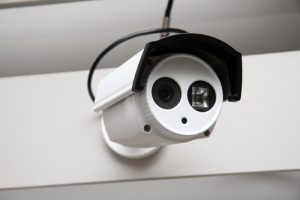Kansas Capitol camera costs up for debate

EYES ON: Kansas state Senators reacted favorably to a proposal that would initiate a pilot online video program in four of the Capitol’s 13 legislative committee rooms.
By Travis Perry │ Kansas Watchdog
TOPEKA, Kan. — High cost estimates scuttled Rep. Stephanie Clayton’s vision of full-blown government transparency under the Kansas Capitol dome before it got a hearing.
But state senators Thursday shifted the focus from whether the state can afford online video of public meetings, instead debating whether Kansas can afford not to implement the next step in technological transparency.
With an estimated sticker price of $900,000, the original bill from Clayton, R-Overland Park, would have launched the Kansas Legislature into the 21st century by establishing online video broadcasting capabilities in all 13 Capitol committee rooms, as well as in the House and Senate Chambers.
Up for discussion before the Senate’s Federal and State Affairs committee Thursday was a scaled-back pilot program, sponsored by Sen. Kay Wolf, R-Prairie Village, wherein lawmakers would designate four committee rooms for web streaming. The state has estimated this version would cost roughly $178,000 in its initial year.
While the smaller figure may be more palatable to fiscally conscious legislators, there’s evidence to suggest the state’s cost estimates aren’t ideal.
Sue Cotter, information and teleconferencing manager for the Alaska Legislative Information Office, said the northernmost state was able to prep and ready eight committee rooms for online video in 2010 for about $190,000. The previous year, Alaska had authorized a short pilot program to test out the concept on two of Alaska’s 10 committee rooms.
Becky Wood of the Nevada Legislature’s Broadcast and Production Services department said the Silver State invested about $200,000 in 1991 for video teleconferencing purposes in every committee room within their state’s Capitol. A decade later, an additional $72,000 investment put those same video feeds online for public consumption.
Jim Miller, chief legislative information technology officer for the state of Kansas, said his research into what other states have done focused primarily on an online database of state broadcasting capabilities compiled by the National Conference of State Legislatures. However, that database only details what they can do, not how they went about doing it.
Lucas Ingala, owner of Watchmen Security Services in Lees Summit, Mo., which specializes in remote camera surveillance, examined a cost breakdown of Clayton’s original proposal provided to Kansas Watchdog by Miller. Considering how all rooms are already wired for video, which is often the most labor-intensive part of the job, Ingala said the fiscal estimate seemed on the high side.
While it’s difficult to directly compare technological capabilities and feasibility between state governments, as each faces its own unique set of challenges, the fiscal efficiency demonstrated by other states certainly deserves a closer study.
SB 413 doesn’t specify which four committee rooms would come under the camera’s gaze in 2015, should the bill become law. While the House Appropriations, as well as the Senate’s Ways and Means, Education and Federal and State Affairs committees are all being considered, the final decision is now left up to Miller and legislative leaders.
Wolf’s proposal made odd alliances, bringing together Americans for Prosperity, the Mainstream Coalition, Game On for Kansas Schools and the Kansas Police Institute, all in the name of transparency.
Dave Trabert, KPI president, argued in favor of Clayton’s original, and more expensive, plan. It’s a position not usually seen by the fiscally conservative think tank, though Trabert came armed and ready with a way to foot the bill.
Pointing to $1.5 million in tax refund cash reserves held by the state Department of Revenue, Trabert said the money could easily be swept into the general fund without impacting the state agency. He noted that the fund balances aren’t necessary; tax refunds are netted against tax receipts, rather than being considered a departmental expense.
“This money has not been touched for years, and it never will be,” Trabert said.
Trabert was joined by Sen. Robert Olson, R-Olathe, in calling for full expansion of video broadcasting capabilities.
“What’s going to happen is we’re going to get three or four years into this (pilot) project and someone’s going to want to kill it, and they will,” Olson said, referencing Kansas’ two previous attempts at online video 2004 and 2008. “We need to do it all, or we’re just wasting our taxpayers’ money.”
But Miller cautioned against getting over-eager by implementing a large-scale video scheme before state employees have worked out the logistics of online video in the Capitol.
“We’re asking for another disaster if we attempt to do all of this at the same time,” Miller said.
Concerns from state lawmakers included a fear that video could be captured and maliciously edited to distort the truth. Wolf said benefits offered by online video far outweighed any potential negative side effects.
Sen. Mitch Holmes, R- Saint John, criticized the cost of the video initiative, speculating the state would get more bang for its buck by focusing on audio in every conference room.
“I think you miss a lot when you’re only listening to something and not seeing it,” Wolf said. “I would respectfully disagree with you.”
Related: New bill turns cameras on Kansas lawmakers
Related: Eye in the sky: Kansas legislative leader won’t require streaming video
Related: Camera shy: KS legislator sidestep transparency
Contact Travis Perry at travis@kansaswatchdog.org, or follow him on Twitter at @muckraker62. Like Watchdog.org? Click HERE to get breaking news alerts in YOUR state!
The post Kansas Capitol camera costs up for debate appeared first on Watchdog.org.








